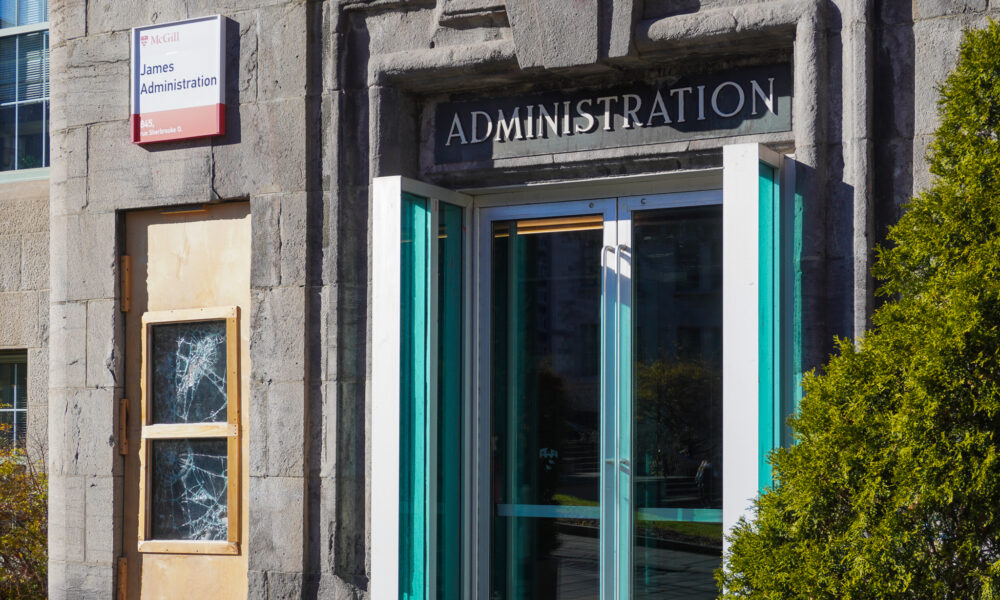The McGill Senate convened on Nov. 13 to address issues such as the increased police and security presence on campus, the adjusted move-in date for first-year students, and academic freedom.
The meeting began with memorial tributes to the late Professor Michael Smith, Professor Emeritus Bohumil Volesky, and Professor James Archibald.
Next, the Senate moved to its question period where the group discussed moving up the first-year move-in date to be closer to the first day of classes. SSMU Arts Senator Anzhu Wei raised concerns about how the timing would affect orientation events, arguing that it would hinder students’ adjustment to campus life. Interim Deputy Provost (Student Life & Learning) Angela Campbell explained that the change was intended to accommodate the newly-introduced Fall Reading Week, adding that the administration would consult student associations to mitigate any adverse effects.
The topic then shifted to campus security and the presence of the Service de police de la Ville de Montréal (SPVM) since the start of the term. Senators raised questions about SPVM’s communication with the university and asked whether McGill would better inform students of future security measures. SSMU Arts Senator Vivian Wright raised the example of the SPVM’s use of force on Oct. 7, and asked if McGill would discourage police from using tactics like tear gas, particularly on non-protesting students. Vice-President (Administration and Finance) Fabrice Labeau responded that the university has no control over SPVM actions.
Senators raised concerns about the current mechanisms for reporting incidents involving campus security. They noted that these mechanisms are not widely shared with the student body. Additionally, they highlighted potential issues with ensuring the transparency and accountability of security when reports are directed to the head of security, rather than an outside actor.
“We cannot count on the formal mechanisms of grievance or rights complaints because they have evidentiary standards and don’t tell us about systemic problems,” Arts Faculty Senator Catherine Lu said. “They are also kind of intimidating. I can imagine that many people just won’t do that because they’re already being upset by a situation. Even police officers need civilian boards in which people can convey information away from internal police monitoring mechanisms.”
Labeau repeatedly expressed that the current mechanisms for reporting incidents with security are a standard procedure. He also underlined that McGill has “fewer and fewer additional security members from outside companies on campus these days.”
President and Vice-Chancellor Deep Saini paused the discussion of the specific security question, stating it would continue in the open discussion. SSMU VP University Affairs Abe Berglas raised a point of order, arguing that postponing the discussion violated Section 9.3 of the Senate Standing Rules. Saini assured that he was only rescheduling the topic. It ultimately was not directly revisited during the meeting.
The group also addressed the invitation of speakers to campus following United Nations Special Rapporteur on the Occupied Palestinian Territories Francesca Albanese’s talk on Nov. 3. Campbell then presented a hypothetical scenario where a pro-life speaker’s appearance led to protests and physical altercations. Arts Faculty Senator Juliet Johnson suggested that transparent and accountable security measures are essential when managing controversial events on campus.
“If we’re going to allow these controversial events, which I think we should, we obviously need to have security,” Johnson said. “It’s important for the community, on all sides of these events, to trust the role that security is going to play [….] Then security services need to be accountable and transparent [.…] So we need to inform the community about the reports in general and act on them.”
The meeting concluded with three final items. First, the Academic Policy Committee presented resolutions to establish an M.A. and Ph.D. in East Asian Studies, both of which were approved. Then the Senate discussed proposed revisions to the Policy on Hazing and Inappropriate Initiation Practices to clarify reporting procedures, and recommended them for Board of Governors (BoG) approval. The session ended with the annual reports from the BoG, Academic Policy Committee, and Committee on Physical Development.
Moment of the meeting:
Provost and Executive Vice-President (Academic) Christopher Manfredi began the open discussion period by emphasizing McGill’s tradition of supporting diverse viewpoints, where controversial speakers are welcome unless their speech clearly violates Canadian law or hate speech provisions. Citing a 2012 report on a similar campus incident, he underscored that the issues discussed in the meeting are not new. Senators collectively agreed that the university should continue to be a space for open dialogue within the law’s strict boundaries.
Soundbite:
“I want to be able to argue and then have a beer with them after—or a cup of tea, depending on your particular poison—but I think we’re moving further and further away from that.” –– Medicine and Health Sciences Senator Terry Hébert on inviting controversial speakers to campus.







